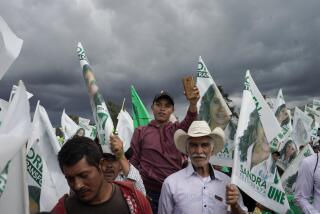Hard Questions
- Share via
Congress is again starting to ask hard questions about the latest twists in the Reagan Administration’s adventurist policies in Central America. We hope that this renewed concern does not collapse into another craven endorsement of President Reagan’s misguided crusade to save the world from tiny Nicaragua.
Administration activities that became public during Congress’ summer recess, and comments made by White House spokesmen during the same period, have raised new questions about how Reagan’s covert war against the Sandinista government in Managua is being conducted. Foremost among them was the revelation that a key White House staff member, Lt. Col. Oliver North of the National Security Council, has been in regular contact with rebels fighting to overthrow the Nicaraguan government. At about the same time, some Administration officials were saying, for publication, that it was impossible for the United States to reach an accommodation with Nicaragua as long as the Sandinistas are in power--implying that helping to overthrow them is the only viable strategy left for this nation in Central America.
North’s activities may have included raising money for the Nicaraguan rebels, who are better known as contras. By doing so, North may have violated the Boland amendment, a 1984 act of Congress that barred any government intelligence agency from spending money to support the contras. Last week leaders of both the House and the Senate Intelligence committees said that they will investigate the relationship between the contras and the National Security Council.
So far the Administration’s response to criticism of North’s activities has been evasive and legalistic. Spokesmen for the White House have insisted, for example, that North did not actually help the contras, but only maintained contact with them and tried to keep their morale up. Others have suggested that he did not violate the Boland amendment, because it was only intended to limit the activities of the CIA and intelligence agencies in the Defense Department--as if the National Security Council never engages in information-gathering and assessment.
The congressional investigations will try to clarify these issues, but the committees must go further than that. If Congress just nitpicks Administration strategy in Central America, it will give Reagan and his spokesmen a chance to obfuscate about Nicaragua--something that they do quite well--and avoid these more fundamental questions: What are the United States’ legitimate interests in Central America? And is Reagan’s approach the best way to achieve them?
Reagan has never really asked himself that, because he is comfortable with his ideological view of the world. We are the good guys and the Sandinistas are the bad guys, so we must toss them out. It does not bother him that every important ally that we have in Latin America thinks that this simplistic outlook is wrong and that his heavy-handed strategy in Central America is doomed to fail. So far only a few members of Congress have had the courage to raise similar challenges to Reagan on Central America. The many Democratic congressmen who switched sides in June and voted to give Reagan money for “humanitarian” aid to the contras were more afraid that Reagan would accuse them of being soft on communism than they were concerned about his stumbling into an unnecessary war with Nicaragua.
Congress must buck up its courage and work to cast light on all of the Reagan Administration’s covert campaigns against Nicaragua, of which North’s activities are just one instance. The committees could also, for example, look for possible American involvement in questionable intelligence-gathering activities by military officials in Honduras. In recent weeks the Honduran army has brutally raided a refugee camp, killing and injuring several people, looking for suspected guerrillas from El Salvador. It also arrested and mistreated an American priest whom it suspected of “subversive” activity. In both instances eyewitness accounts suggest that some U.S. military personnel stationed in Honduras to keep an eye on neighboring Nicaragua may have been involved.
Congress must also question the whole premise of Reagan’s strategy against Nicaragua: that a small, poor country of 3 million is such a dire threat to the United States that all legal, moral and human considerations can be set aside in order for its government to be overthrown. Opinion polls indicate that the vast majority of Americans see the cynicism and sheer folly of such thinking. Certainly our friends in Latin America do.
Only Reagan and a minority of ideologues refuse to accept the fact that the United States can defend its interests in Central America, and learn to live with Nicaragua’s revolutionary government, without bloodshed and violence. It will take skill and patience, to be sure. But most Americans have confidence that our economic power, and the moral pressure of our Latin American allies, can overcome the Sandinistas’ revolutionary fervor and mistrust far more effectively than bullets and bombs can. If the Administration refuses to follow this more constructive course, Congress must at least keep it from doing any more damage in Central America. A good first step would be to renew the Boland amendment, using the clearest and most forceful language possible.
More to Read
Sign up for Essential California
The most important California stories and recommendations in your inbox every morning.
You may occasionally receive promotional content from the Los Angeles Times.











